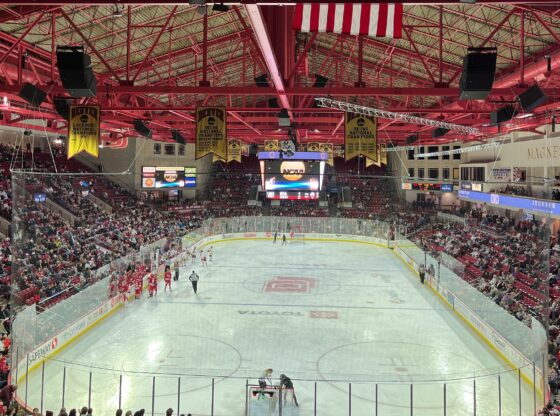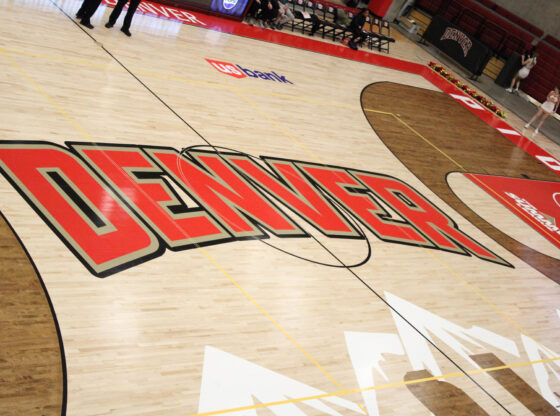On Wednesday, Jan. 16, DU’s Chancellor Rebecca Chopp (RC) sat down with DU Clarion Editor-in-Chief Taryn Allen (TA) and News Editor Daniela Santos (DS) to answer some questions submitted by students and the paper’s editorial team. Chancellor Chopp touched on various subjects including upcoming construction plans, addressing hatred on campus, assisting transfer students, Impact 2025, the potential growth in media related fields and the university’s goals for 2019.
(DS) What are the plans for organizations like the Center for Multicultural Excellence and DU Clarion who were originally housed at the Driscoll Student Center?
(RC) Once we open the Community Commons you’ll have spaces in those new buildings, so the question is really what happens in the kind of interim because that building won’t open until the fall of 2020. The Clarion has temporary space in the Hub, formally the SAE house, until you move into the commons. If there is an issue with that space then you need to talk with Lili Rodriguez, the vice chancellor. The Center for Multicultural Excellence (CME), after both the Vice Chancellor Rodriguez and I met with a lot students at the end of the semester, they too had space in the Hub, but it really wasn’t working to meet a variety of their needs, so we had to think of a two prong strategy because, you know, space is tight on this campus. Right now, they have a additional space in the Newman bungalow which is housed between the Newman Center and the school of engineering, and we have obtained a property on York avenue which we will be turning into a space for CME. It’s going to take us little time because it needs some remodeling; I don’t have specific dates, but it is kind of a two prong strategy.
(DS) What measures has DU taken in the past year to combat racism, homophobia and other forms of hatred on campus?
(RC) This is an ongoing journey for us. We’ve been working on this and are well aware of the impact of the greater society on us and as times change, we have to employ new strategies. In the last year we’ve done a variety of things; we’ve done the freedom of expression committee, and the undergraduate student body has representatives, as does graduate and the faculty senate and their other faculty as well, that is responsible both to advise me in a time of particular crisis when a big event is happening, but in other times to try to help cultivate in the culture a way to have rigorous conversations where people both listen and can express themselves. Darrin Hicks is chairing that, and he’s the chair of the faculty senate. And this goes with the revision of our freedom of expression policy, but it’s a pretty, in a way, standard policy in the university. What’s unique about our policy is actually the faculty and the students themselves establishing this committee to do ongoing teaching, intervention, advice and counsel. There are lots and lots of training sessions that come out of Campus Life and Inclusive Excellence (CLIE), education, support sessions; we are putting in place this first year program called Camp Compass—so both in orientation and across the first year a lot of different kinds of workshops and training events to help students learn. It’s not, after all, just students who represent underrepresented cultures in our campus, it’s all students that do this.
(…)
We’ve done a soft launch to a bias incident response team to help with students around expressions of hate and microaggressions. I say it’s a soft launch because we found, you know, you can get 20 students to plan something with 20 staff and you roll it out and all of a sudden you find something new. Soft launches are our way to get input, try it and then adapt it before we fully announce what it’s going to be.
(…)
One of the things I’ve always appreciated about DU is, in some institutions I’ve been, it’s like there’s a problem, administration has to fix it. And here it’s been: we all have to do our part.
(…)
(DS) What systems have been put in place to help transfer students at DU, and how are you improving on it for future students?
(RC) We have now on the website clarified the credit evaluation policies. I was a transfer student, so I know this well—what’s going to count and what’s not going to count. We’re also developing an articulation agreement process for transfer students at the third- and fourth-year level. Second year (students) have more freedom but third and fourth year cannot waste time; they need to hit the ground running. We are consciously doing a lot to recruit local students and work hard with community colleges. I think we’re going to see in America more and more students go to community colleges and then transfer into places like DU. We shouldn’t have to necessarily wait until they are on campus to welcome them to DU to get them part of the culture. So it’s both recruiting but also making them feel at home here because again they’ve got to get going fast. That’s everything from working with specific community colleges—we work with a lot but really try every year add a couple more community colleges—and then lots of communication. Admissions has built a quite specific campus visit designed for our transfer students that really focuses on all the questions that transfer students might have. We just recently expanded aid to transfer students. In general, one of the things we are now doing more and more of is trying to drive more of a partnership between student affairs, admissions and academics so that it’s more seamless for students.
(TA) In your words, how would you describe Impact 2025?
(RC) I think that Impact 2025 is really about preparing students with knowledge for the 21st century. We know that everything is going to be really different, you are going to change jobs a lot more. You don’t need the profound knowledge base, but equally so, you need to learn how to learn. Most of Impact 2025 in one way or another is an answer to the question, “What do you our students need to know and be prepared for in the 21st century?” Emotional intelligence, career achievement, experiential education, more collaboration, innovation—all of those things are going to be built more and more into the curriculum and into the student experience.
That’s true if you look at what is going to go on in the residence halls and the career achievement center that’s building, but it’s also true in the academic side. We’re expanding what we call a “grand challenges approach” where faculty and students partner with local communities and local nonprofits to tackle a problem. It’s like you get to already be engaged in what you will do at work and blend that together with your academic experience. (…) It’s a much more experiential based, much more focused approach on how you are going to learn and much more focused approach on collaboration and being in teams.
(TA) There’s some frustration with students who are here in the interterm when there’s a lot of construction and stuff before this is all going to launch. What would you say to students who are feeling that way?
(RC) Well I think some of the programs are already launching. The career achievement program has launched quite strongly; I think we had something like 47 percent of the first-year students in our career achievement services in the first quarter, which is unheard of around the country. Around the country only about 33 percent of students ever show in career services, and they do so in their senior year. We’re trying to do the programing, we’re doing the programming now and, like your question about spaces, we’re trying to find the spaces that are getting disrupted by the construction. I think the construction will be easier here on out; normally—as you begin a project—it’s just more difficult to work out the kinks. I think as we keep moving forward it should be easier; we will know more, students will have provided more feedback. You think you should be able to anticipate all these things. but you’re not.
(TA) Local news is becoming increasingly scarce and the risk of fake news and misinformation is becoming problematic. For current and incoming students hoping to work in journalism and other media-related fields, how will DU cater to the growth and development of MFJS students?
(RC) The theme of news, journalism and communication is extremely important to us. If you think about education and journalism really being the two sectors that have served democracy, exceedingly well so of course we’re interested in that service to democracy. We have just added to our board of trustees Greg Moore who is a former publisher of the Denver Post and the Boston Globe. He’s a well-recognized person to help us think through some of these ongoing realities. In terms of the specific department, programs and courses offered, that is really up to the provost and the faculty in that department.
(DS) What are your goals for DU in 2019? What do you believe DU is best at, and what do you think needs improvement on?
(RC) One goal is certainly to get this construction well underway. And we’re working hard on that because we can’t have delays. We can’t have delays on the resident’s hall because those students are going to show up and they’re going to need their beds. And we don’t want delays on the community commons. I think we continue to work in the area of career achievement, that also covers things like internships, your connection to alumni. We done so much research and continued to do it on what you all need. We’re getting ready for a capital campaign to raise additional funds for the University and we’re in the midst of planning that. One of our biggest areas will be around financial because we simply need more financial aid. More and more financial aid for undergrads and graduate students.
We are starting a conversation on what is community at DU and what are our key values. It’s pretty clear that many of the students, faculty and staff want more community. It’s also clear that feeling like you belong and are supported is important for learning and thriving and dealing with stress. The community models that we’ve had out of the 20st century aren’t particularly workable so we are proposing to launch an 18-month process about both talking about community and creating community. But this has got to be really driven by everyone who wants to participate. I can do all the research, sit down with a group of people and do a strategic plan but this is really about people engaging and then at some point stepping back and saying, “what are our values? What do we want to be known for?” When students select DU, we want them to say, “I am going to that school because it really does x, y and z.” I don’t have a grand design, we are spending this quarter designing this process. Last night we went to the undergraduate student government, graduate students, we’ve been to the staff advisory council, we’ve pulled a lot of faculty together (…) to talk about this. So how do we design a process that will create the kind of community that we want to belong too. It’s not all feel good, because as you know many people feel like they don’t belong here, they feel already excluded. So how do we create a community that can talk truthfully about that and about a variety of perspectives but also identify those values that can help us actualize that change and be the community we want to be? This is a really big project and hopefully by the spring quarter we’ll be able to launch it in some specified way. Usually we can sit here and consult with people and develop a plan but this feels like it’s going to be a much bigger conversation.











